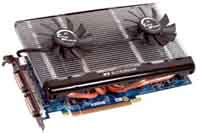All variables equalized.. any CPU can be over-clocked.. so, to me, that bigger L2cache is the key.
This leads me to believe that dual-core, small cached CPU (x2 3800) is a lesser gaming CPU than an x1 3700 with the 1mb L2.. for FS9, anyway...
You are correct in your assessment of the L2 size and your choice in the San Diego single core CPU for the application you are going to be using it with. However there is something to consider in the next generation of games/motherboards/video adapters and operating systems when it comes to dual core processors... will that come to market before your next system purchase? Possibly but probably not. It is getting close to the time when software will be released which will have full x64 support and then remains the R&D period before the software/hardware are completely debugged. Many modern motherboards support both single and dual core CPU's so the upgrade can be easy when the time comes. I do not see the PCI-E standard going away any time soon and I agree with congo that SLI is
currently a hardware purchasing gimmick
I would stick with the single core for now.
Memory selection for performance should include the over clock factor before making a final purchase. Research into the motherboard and memory combination is the key to how well a processor will remain stable in an overclocked environment, which includes over-clocking the video adapter.
Lower memory timing and not using a divider was critical in the days prior to the A64 processor however since components that make up the northbridge of the past are now incorporated into the A64 architecture, using higher memory timings and the motherboard dividers do not have the same performance loss it did in the past. What is more important are well designed lower timing modules which will allow "overhead" in FSB stability @ higher clocks by raising those timings and the frequency i.e.; 200mhz (DDR400) 2-2-3-5 with 1T spec modules in an over clock environment provide better real world performance @ 280mhz, 5:3 divider (DDR333) 2.5-4-4-11 1T because they will allow the processor/memory buss to hit higher FSB, stable. With A64 that is key to high performace.
Memory modules should always be purchased with 1T ability @ higher buss speeds because the A64 processor/buss responds better with 1T enabled. It is not 100% necessary to stay @ 1T but real world performance will be effected with positive results by running 1T, more so than getting an extra 5-10Mhz out of the buss.
OCZ is an excellent choice for memory product. They also have a good support forum with OCZ techs that will assist in making the purchase based on the system and its use. They also provide that long list of memory timing settings in most modern BIOS's which are normally set on AUTO because usually only the manufacture of the module knows what those settings will provide in stability during a performance over-clock.
PS: Do not shirk or go cheap on the power supply... that purchase is the #1 reason for low clocking ability and lack of stability in higher clocks, and many times lack of stabilty even without any over-clock.
It is always best to put out more money on a high spec/clean signal PSU than it is to throw money at the processor and expect a cheaper PSU to run it stable.
The extra money spent: Call it insurance for a happy system and owner.
Last edited by fish-n-pilot on Thu Mar 16, 2006 4:15 pm, edited 1 time in total.


 . The only two that I know of are form ASUS and MSI. For the extreem overclocker DFI LanPartys have some amazing BIOS features, however have other things like faulty IDE RAID etc. If you go the crossfire route, there are some pretty decent ATI Express 200 boards from Gigabyte. Pretty much tell us what you want to do, and we shall suggest a board *cough* passive cooling *cough*
. The only two that I know of are form ASUS and MSI. For the extreem overclocker DFI LanPartys have some amazing BIOS features, however have other things like faulty IDE RAID etc. If you go the crossfire route, there are some pretty decent ATI Express 200 boards from Gigabyte. Pretty much tell us what you want to do, and we shall suggest a board *cough* passive cooling *cough*





 Mainboard: Asus P5K-Premium, CPU=Intel E6850 @ x8x450fsb 3.6ghz, RAM: 4gb PC8500 Team Dark, Video: NV8800GT, HDD: 2x1Tb Samsung F3 RAID-0 + 1Tb F3, PSU: Antec 550 Basiq, OS: Win7x64, Display: 24&
Mainboard: Asus P5K-Premium, CPU=Intel E6850 @ x8x450fsb 3.6ghz, RAM: 4gb PC8500 Team Dark, Video: NV8800GT, HDD: 2x1Tb Samsung F3 RAID-0 + 1Tb F3, PSU: Antec 550 Basiq, OS: Win7x64, Display: 24&





